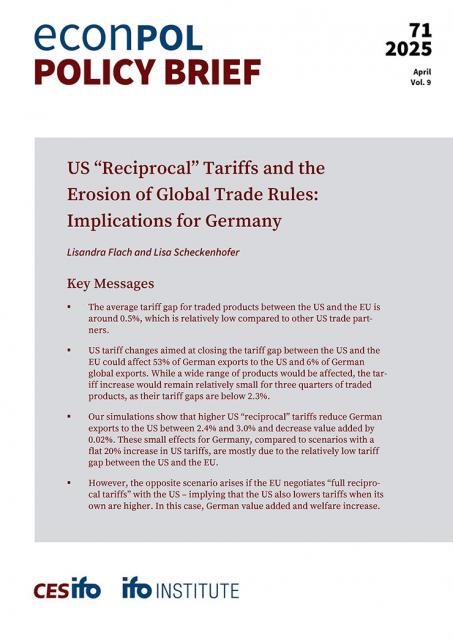News Archive

How to Unleash the Full Potential of Europe’s Financial System
|
Policy Brief
| News
In a new Policy Brief, experts from the German Federal Bank (Deutsche Bundesbank) argue that completing the Banking Union and advancing the Capital Markets Union are crucial for a successful transformation of the economy.

International Collaboration in Digital Knowledge Work
|
EconPol Forum
| News
Europe’s digital economy lags behind the U.S., with cross-border collaboration among software developers 16.4 percent lower than within countries—a barrier 73 percent greater than U.S. states. Cultural and language differences are key obstacles, limiting the potential of Europe’s vast talent pool. Policies focused on reducing these barriers and fostering international teamwork are critical to unlocking Europe’s digital competitiveness.

How Can the EU Boost Competitiveness with Smarter Legal Frameworks?
|
EconPol Forum
| News
The EU has significantly shaped framework conditions in areas such as data protection, consumer health and safety, environmental protection, the supply chain, and antitrust law. However, the EU’s overregulation in some areas is seen not as beneficial, but as a detrimental factor limiting innovation, competition and growth. The EU now needs better, evidence-based regulation ensuring that its legislation is drafted in a transparent and inclusive manner and is as simple and targeted as possible to reduce unnecessary bureaucracy burdens and costs.

EconPol Europe Annual Conference: Videos Now Available
|
EconPol Europe Annual Conference 2024
| News
Our EconPol Annual Conference 2024 has come to a successful close. About 180 guests followed our exciting panels on the future of the EU's single market, EU innovation policy and EU defense policy in Brussels. For those who were unable to join us on site, video recordings as well as a conference summary are now available on our website. Videos include the keynote speech by Kerstin Jorna and the panel discussions with our top line-up of speakers, François Arbault, Marco Buti, Daniel Gros, Angelika Niebler, Jan Pie, and Guntram B. Wolff, among others.

Transition to Electromobility Slows Down
|
EconPol Forum
| News
Labor demand in the German automotive industry has hit a low. The number of job ads in October 2024 was 53 percent lower than in August 2023. In December 2023, companies focused on electromobility advertised almost twice as many vacancies as those focused on combustion engines. This difference has now been reduced to 41 percentage points. These are the results of an analysis of around 1.6 million job ads from almost 2,400 companies in the German automotive industry published in the new EconPol Forum.
